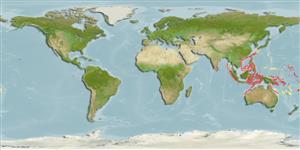Environment: milieu / climate zone / depth range / distribution range
экология
морской батидемерсальный; пределы глубины 200 - 270 m (Ref. 9494). Deep-water
Western Central Pacific: Philippines, Indonesia and Australia.
Size / Вес / Возраст
Maturity: Lm ? range ? - ? cm
Max length : 22.0 cm SL самец/пол неопределен; (Ref. 311)
колючие лучи спинного плавника (общее число) : 0; членистые (мягкие) лучи спинного плавника (общее число) : 67 - 70; колючие лучи анального плавника: 0; членистые (мягкие) лучи анального плавника: 50 - 53. Color of preserved specimens tan to dark grey on the ocular side; tan or whitish on the blind side. Pectoral fin rays 11-13 on ocular side; 11-12 on blind side. Pelvic fin of ocular side with black spot and shorter than that on the blind side. Gill rakers elongate and pointed. 1st interhemal spine stout.
Inhabits mud and sand bottoms (Ref. 9774). Feeds on crustaceans and other benthic invertebrates (Ref. 9774).
Life cycle and mating behavior
Maturities | размножение | Spawnings | Egg(s) | Fecundities | личинки
Distinct pairing (Ref. 205).
Hensley, D.A. and K. Amaoka, 1989. A redescription of Pseudorhombus megalops, with comments on Cephalopsetta ventrocellata (Osteichthyes: Pleuronectiformes: Paralichthyidae). Proc. Biol. Soc. Wash. 102(3):577-585. (Ref. 2688)
Статус Красного Списка МСОП (Ref. 130435)
Угроза для людей
Harmless
Использование человеком
дополнительная информация
инструменты
Специальные отчеты
Скачать в формате XML
ресурсы в Интернет
Estimates based on models
Preferred temperature (Ref.
123201): 11.7 - 20.8, mean 15 °C (based on 37 cells).
Phylogenetic diversity index (Ref.
82804): PD
50 = 0.5000 [Uniqueness, from 0.5 = low to 2.0 = high].
Bayesian length-weight: a=0.00741 (0.00343 - 0.01604), b=3.17 (3.00 - 3.34), in cm total length, based on LWR estimates for this Genus-body shape (Ref.
93245).
Trophic level (Ref.
69278): 3.5 ±0.44 se; based on food items.
устойчивость к внешним воздействиям (Ref.
120179): высокий, минимальное время удвоения популяции до 15 месяцев (Preliminary K or Fecundity.).
Fishing Vulnerability (Ref.
59153): Low vulnerability (17 of 100).
